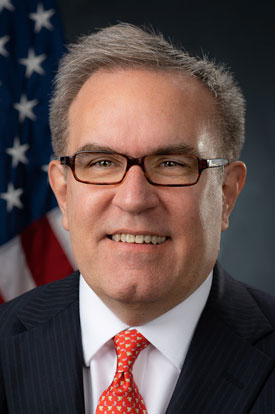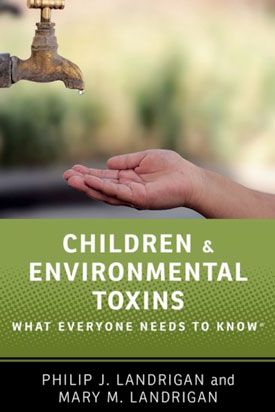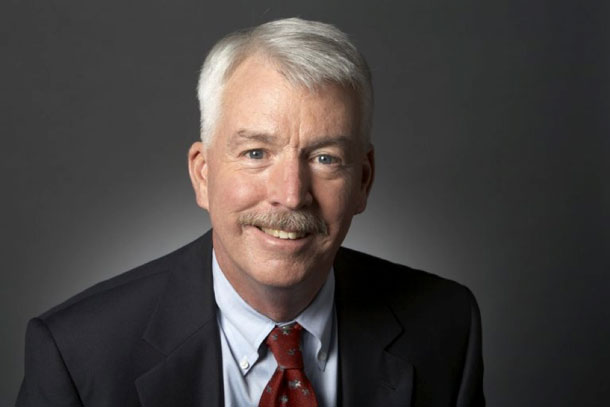EPA Seeks Confidential Health Records
Air Date: Week of November 15, 2019

Smog over San Francisco’s tallest building. (Photo: Denys Nevozhai, Unsplash, CC)
The Environmental Protection Agency sets standards for chemical safety and limits on pollutants in our air and water to protect public health. These standards are based in part on the evidence provided by epidemiological studies. Now leaked documents say the agency is seeking to require any study used for its health and safety rulemaking to disclose all of its raw data, including confidential medical records. Host Steve Curwood sat down with Philip Landrigan, Founding Director of the Global Public Health Program and Global Pollution Observatory at Boston College and one of the world’s leading experts on public health, to discuss the implications of this policy and the fierce opposition it has provoked.
Transcript
[THEME]
BASCOMB: From PRI and the Jennifer and Ted Stanley Studios at the University of Massachusetts Boston, this is Living on Earth. I’m Bobby Bascomb.
CURWOOD: And I’m Steve Curwood.
According to a draft document obtained by the New York Times, the Environmental Protection Agency is seeking to require any study used for EPA health and safety rulemaking to disclose all of its raw data, including confidential medical records. For an assessment of the leaked proposal we turn now to pediatrician and epidemiologist Philip Landrigan of Boston College. He’s one of the world’s leading advocates for children’s health. Dr. Landrigan, welcome to Living on Earth.
LANDRIGAN: Steve, it's a pleasure. Thank you.
CURWOOD: Now the EPA has a proposal they call strengthening transparency in regulatory science, which would require researchers to disclose all of their raw data, including confidential medical records. What do you make of this?
LANDRIGAN: Well, I think that this is a very dangerous proposed regulation. And it's also very badly misnamed, because this proposal has nothing to do with transparency and regulation. And it has everything to do with dismantling regulations that have been in place for many years, that have been very effective at reducing pollution in the United States and very effective in preventing disease that is caused by pollution.
CURWOOD: What's the problem with giving the EPA access to the raw data for both past and present studies?

Smog over Los Angeles. (Photo: Maciek Lulka, Flickr, CC)
LANDRIGAN: Well, the problem here lies in the way these studies are done. So typically, let's say the studies on air pollution. Typically the researchers go out to a city to a town. They measure levels of air pollution in the air and then they go in, they interview people, do medical examinations, take tests, do lung function tests, perhaps they do x-rays. And all of that information goes into the computer. And the goal of this study is to correlate a given level of air pollution, with disease in people. And these studies have established a whole series of important connections, they found that air pollution causes asthma in children. It causes increased risk of heart disease and stroke and lung cancer and diabetes in adults. But the rub is that when the medical researchers, when the doctors and the nurses interview the people who are in these studies, they always promise these people confidentiality. I mean, that's just, that's the way doctors and nurses operate. If I were do an exam on you, you wouldn't want me to post your medical findings on the internet the next morning. Same here. This regulation, this so called transparency regulation, would require the medical researchers to reveal all of that information on each individual person who's in the study. Well, ethical researchers are not going to do that. So in that case, what EPA is going to do is turn around and say, okay, you won't give us your data, you won't break your promise to your patients, we're going to throw out your study, your study doesn't count. And consequently, the whole scientific basis for the rulemaking will be dismantled. This is a very dangerous, a very malicious proposal that's coming out of the administration.
CURWOOD: Now, talk to me about one of the major bones of contention that perhaps is related to this regulation, the study known as the Six Cities study on air pollution that was conducted by folks at Harvard, and I gather that that came out in 1993. But almost 30 years later, the folks were still trying to get the confidential records of that study. Why is that study so important? Why is it, why is it related to the efforts to try to change the regulation?

Andrew Wheeler is the Administrator of the EPA, and has continued support of a rule change first championed by his predecessor, Scott Pruitt. (Photo: EPA)
LANDRIGAN: Well, the Harvard Six Cities study is really the foundational study that has related air pollution to chronic non communicable disease in the American population. There have been other studies since that time that have confirmed the six city studies findings, but the Six Cities study remains the bedrock of this whole regulatory body. And while it's true that the first paper was published back in the 1990s, the study continues to produce new information and it’s publishing new reports practically every year up until the present time. And what the Harvard Six Cities study did in the first instance was correlate levels of fine particulate air pollution with elevated rates of heart disease, stroke, lung cancer, diabetes, and other diseases, asthma in children, premature birth weight in newborn infants. More recently, as the investigators have continued to dive down into the data that continue to be produced from this study, they have shown that air pollution causes negative health effects at even down to very low levels, even down to levels that we used to think were safe. And that really bothers the regulated industries because those findings will require that levels of pollution be reduced. That means that industry is going to have to clean up its act. And I think that's why the industry lobbyists who’ve gone to work and come up with this scheme, to in the name of transparency, to disallow all the findings from the Harvard Six City studies and from other similar studies that have been conducted across the United States.
CURWOOD: You know, for the record what kind of data is currently required to be disclosed to the Environmental Protection Agency for studies that are used as the basis of rules?
LANDRIGAN: Well, the investigators always provide their statistical findings. They always provide their published reports. And in the case of the big air pollution studies a few years ago, when the same question came up, EPA and the researchers got together, they agreed on having an independent third party go in and look at the confidential data. And this third party, which is the Health Effects Institute so it's a very respected group based here in Boston, supported jointly by EPA and the Automotive Manufacturers Association. Health Effects Institute had two distinguished researchers go into the records review the records, confirmed that the records were accurate. Those scientists said that the science was good. There was no need to go any further, no need to reveal confidential records. And at that time several years ago, the rule was left to stand. But now the EPA is circling back around. They're re-raising this specter of transparency and essentially, they're trying to gut the regulations.

Philip Landrigan’s most recent book (Photo: Courtesy of Oxford University Press)
CURWOOD: Now you're a practicing physician, pediatrician, you've done a number of environmental health studies yourself. How would this rule affect your ability to conduct the kind of epidemiological studies that you've done over your career?
LANDRIGAN: Some of the studies I've done have been studies of children exposed to lead. And specifically, these studies looked at the question of whether relatively low levels of lead in children were reducing the children's IQ. We're talking about children who are exposed to lead, who have no obvious signs and symptoms of poisoning. But the question is, are these children's intellectual capabilities being reduced because of their exposure to lead. And when we do those studies, there are basically two data points that we collect in each child, we collect the child's blood lead level and a psychologist does an IQ test on the child and then we also collect various other bits of information on family structure and home environment and so on. Well, when you think about it, this is very confidential information that we're collecting on those patients. We’re collecting information on a child's IQ, which is obviously sensitive information. We're asking about family income, health of the parents, quality of the home environment. I mean, I don't think most people would want that information divulged to government regulators, especially if they'd been promised confidentiality. But if EPA decided that they wanted my raw data at this point in time I would not give it to them, I would honor my word to my patients. But what that would mean is that EPA would throw out the results of my study, and they would decide not to use my data in making a regulation to protect children against lead poisoning.
CURWOOD: How do you feel about this?
LANDRIGAN: First of all, I'm angry. And what I expect we'll see happen if these regulations take effect is that levels of air pollution will go up. And the consequence of that is people will die. More children will have asthma, more babies will be born with low birth weight. More adults will suffer heart disease, stroke and lung cancer and premature death as a consequence of increased levels of air pollution. So the regulated industries may get a little reprieve for a few years. But the burden of disease and premature death is going to fall on people across the United States. There are no winners here, only losers except for the regulated industries. This is not the way government is supposed to be acting. Government is supposed to be acting to protect the health of the public, to protect the health of the most vulnerable among us, the children, the elderly, the people who need help. I think it was Winston Churchill who once said that governments can be judged on how they care for the weakest among us and these actions are not taking good care of the weak among us.

Philip Landrigan is the Founding Director of the Global Public Health Program and Global Pollution Observatory at Boston College (Photo Courtesy of Boston College)
CURWOOD: Philip Landrigan is an epidemiologist, pediatrician, professor of biology and director of the program in Global Public Health and The Common Good at Boston College. Dr. Landrigan thanks so much for taking the time with us today.
LANDRIGAN: Thank it's a pleasure.
Links
The New York Times | "E.P.A. to Limit Science Used to Write Public Health Rules"
Click here to read the EPA’s response contradicting the New York Times report
Read a response from the International Society of Environmental Epidemiologists
Click here to read comments responding to the original rule proposal from 2018
Living on Earth wants to hear from you!
Living on Earth
62 Calef Highway, Suite 212
Lee, NH 03861
Telephone: 617-287-4121
E-mail: comments@loe.org
Newsletter [Click here]
Donate to Living on Earth!
Living on Earth is an independent media program and relies entirely on contributions from listeners and institutions supporting public service. Please donate now to preserve an independent environmental voice.
NewsletterLiving on Earth offers a weekly delivery of the show's rundown to your mailbox. Sign up for our newsletter today!
 Sailors For The Sea: Be the change you want to sea.
Sailors For The Sea: Be the change you want to sea.
 The Grantham Foundation for the Protection of the Environment: Committed to protecting and improving the health of the global environment.
The Grantham Foundation for the Protection of the Environment: Committed to protecting and improving the health of the global environment.
 Contribute to Living on Earth and receive, as our gift to you, an archival print of one of Mark Seth Lender's extraordinary wildlife photographs. Follow the link to see Mark's current collection of photographs.
Contribute to Living on Earth and receive, as our gift to you, an archival print of one of Mark Seth Lender's extraordinary wildlife photographs. Follow the link to see Mark's current collection of photographs.
 Buy a signed copy of Mark Seth Lender's book Smeagull the Seagull & support Living on Earth
Buy a signed copy of Mark Seth Lender's book Smeagull the Seagull & support Living on Earth

